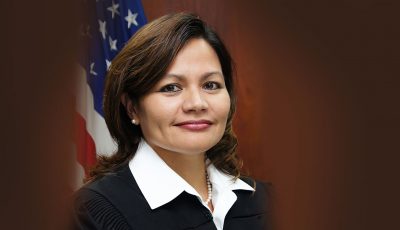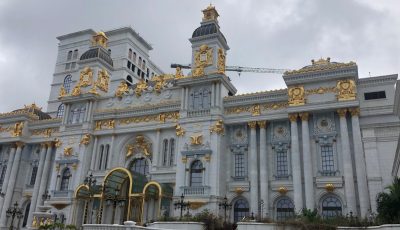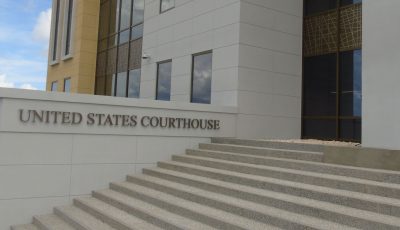2009 class action vs Mobil, Shell is back
The lead lawyer in the case is already dead, and so is the lead plaintiff. Another lawyer in the case has already been disbarred. Yet a class action lawsuit filed in 2009 against Mobil and Shell for alleged price fixing in the CNMI is back alive.
This developed after Superior Court Associate Judge Kenneth L. Govendo on Monday turned down a request by Mobil Oil Mariana Islands Inc. and Mariana Acquisition Corp., which owns Shell Marianas, to dismiss the lawsuit for failure to prosecute.
The plaintiffs filed the case in 2009. Since then, the lawsuit was dismissed, appealed, reversed, and remanded.
Govendo said that after the case returned to court in 2013, the plaintiffs’ lead counsel, Ramon Quichocho, has since been disbarred, others have withdrawn from the case, and another lawyer, Edward C. Arriola, has died.
Now, Govendo said, the new counsel for the plaintiff, has entered his appearance and has requested a trial date and a scheduling order.
“Such an initiative demonstrates plaintiffs’ desire to finally resolve this matter,” said Govendo in denying Mobil and Shell’s motion to dismiss the case.
According to court documents, Rabby F. Syed filed the class action in 2009, seeking damages from the defendants for allegedly conspiring to illegally set gasoline prices in the Commonwealth. Syed filed the class action on behalf of all drivers on Saipan who use unleaded fuel.
That same year, in 2009, Shell Company Pacific Islands Limited entered into a purchase agreement with IP&E Holdings, LLC. The agreement was for IP&E to purchase all the stock in Mariana Acquisition Corp., Shell’s then wholly-owned subsidiary. The sale closed shortly after Syed filed his lawsuit, and IP&E assumed control of MAC in 2010.
Defendants then filed motions to dismiss the case in January 2010. The court granted the motion but allowed class action plaintiffs to amend the lawsuit, which they did. But the court granted the defendants’ new motions to dismiss in March 2011, leaving plaintiffs without leave to amend.
Plaintiffs then appealed the court’s decision to the CNMI Supreme Court. On Dec. 31, 2012, the high court upheld the dismissal of most claims but reversed and remanded the claims for unjust enrichment and violation of the CNMI Consumer Protection Act.
In 2013, the case returned to the Superior Court, and the defendants submitted their responses.
In 2014, the plaintiffs’ lead counsel, Ramon Quichocho, was suspended from practicing law. Plaintiffs later served a request for production of documents. Defendants disagreed with some requests, so the parties met to discuss the scope of production.
In February 2015, the new counsel for plaintiffs entered their appearances, and Edward Arriola took over as lead counsel.
Plaintiffs filed a second amended complaint in July 2015, omitting the dismissed causes of action and replacing Syed with Leo G. Pangelinan. Other named plaintiffs are Eulogio M. Sablan, Jose T. Limes, Jose P. Kiyoshi, and Felipe Q. Atalig.
Both defendants filed answers in August 2015. A couple of months later, the parties stipulated to a protective order regarding the production of documents. The court granted the protective order in February 2016, and defendants began to produce responsive documents, completing production in September 2016.
In January 2017, Charles P. Reyes withdrew as one of the counsels in the case and, in May, lead attorney Arriola died. As a result, Michael W. Dotts took over the case. However, Arriola’s widow did not provide Dotts with the case file until early 2018. Arriola’s widow struggled to complete files for this case because Arriola’s paralegal, Leo G. Pangelinan, who was also the lead plaintiff in the case, died in December 2017.
Pangelinan worked closely with Arriola and only he knew where all the files were located. Super Typhoon Yutu hit Saipan in October 2018, and further delayed Dotts’ progress in the case.
In March and April 2019, two attorneys filed appearances as plaintiffs’ counsel. William R. Satterberg filed his appearance for one named and three unnamed plaintiffs.
Matthew T. Gregory filed his appearance for the plaintiffs generally, bearing a caption with the original plaintiffs.
On April 8, 2019, plaintiffs filed a motion for a status conference, requesting that the court evaluate the case for mediation and set a trial date.
In response, defendants filed the current motions asking the court to dismiss the case for failure to prosecute.
Defendants argue that plaintiffs unreasonably delayed the case because they failed to pursue the case meaningfully since the remand.
Defendants claim that because plaintiffs’ new counsel could have intervened at any time and because they filed only a motion for a status conference, they failed to “press” the case.
In the order Monday denying the motion to dismiss, Govendo said whether counsel could have intervened at any time is immaterial.
Govendo said he does not speculate about the actions plaintiffs could have taken to advance the case; rather, he must determine whether plaintiffs’ actions were reasonable and whether they prejudiced the defense.
Govendo said plaintiffs’ motion for a status conference suggests they are ready to pursue the matter: They want the court to assess the case for mediation and to set a trial date.
Notably, Govendo said, plaintiffs filed their motion within a month of counsel’s entering their appearances and before defendants filed these motions to dismiss.
Plaintiffs attribute the delay to Quichocho’s disbarment in 2014, appearances of new counsel in 2015, counsel’s subsequent withdrawal and deaths in 2017, and a typhoon in 2018.
Although plaintiffs’ filings are minimal, Dotts explained during oral arguments and in his declaration that plaintiffs’ counsel have been working to finance the case, to find experts, and to obtain discovery.
Govendo said defendants fail to show they suffered actual prejudice because their concerns are speculative.
Govendo said the defendants are concerned that documents and witnesses will be hard to locate even though they have known about this case since 2009.
The judge said the defendants are in the best position to safeguard the documents necessary to disprove the plaintiffs’ allegations.
Moreover, Govendo said, defendants’ concerns about class members’ ability to prove their gasoline purchases before 2009 is a matter for plaintiffs to overcome.
Nevertheless, he said, these concerns are speculative because it also follows that defendants can easily locate the documents and the witnesses.
Given these circumstances, Govendo said, he finds that, although the case has been ongoing since 2009, the delay is not unreasonable.



























